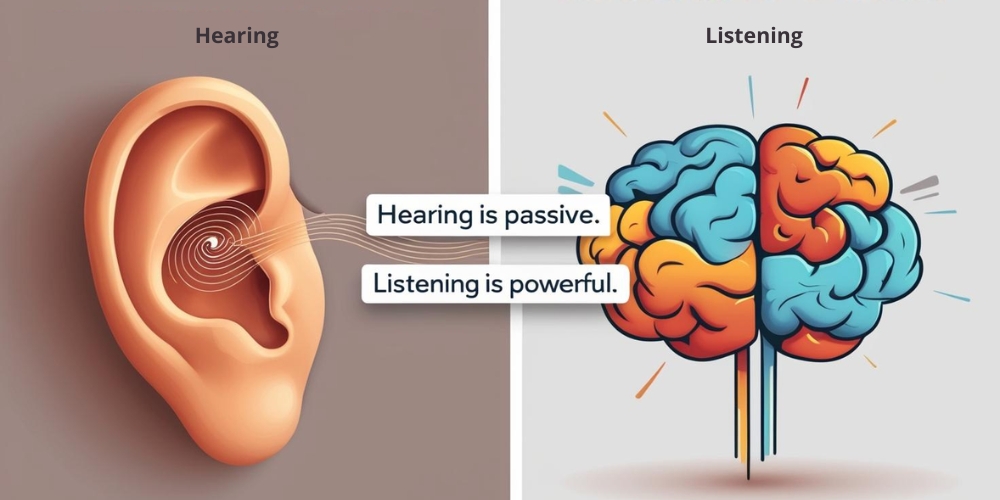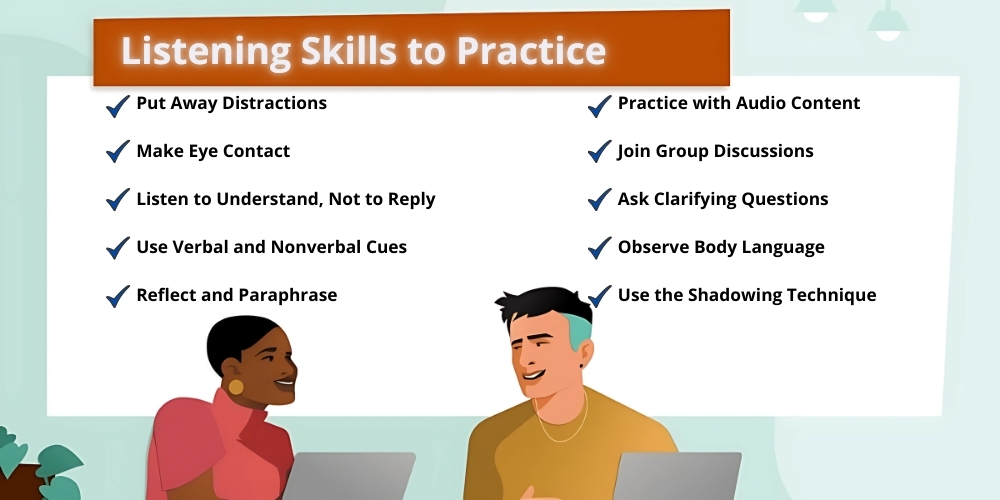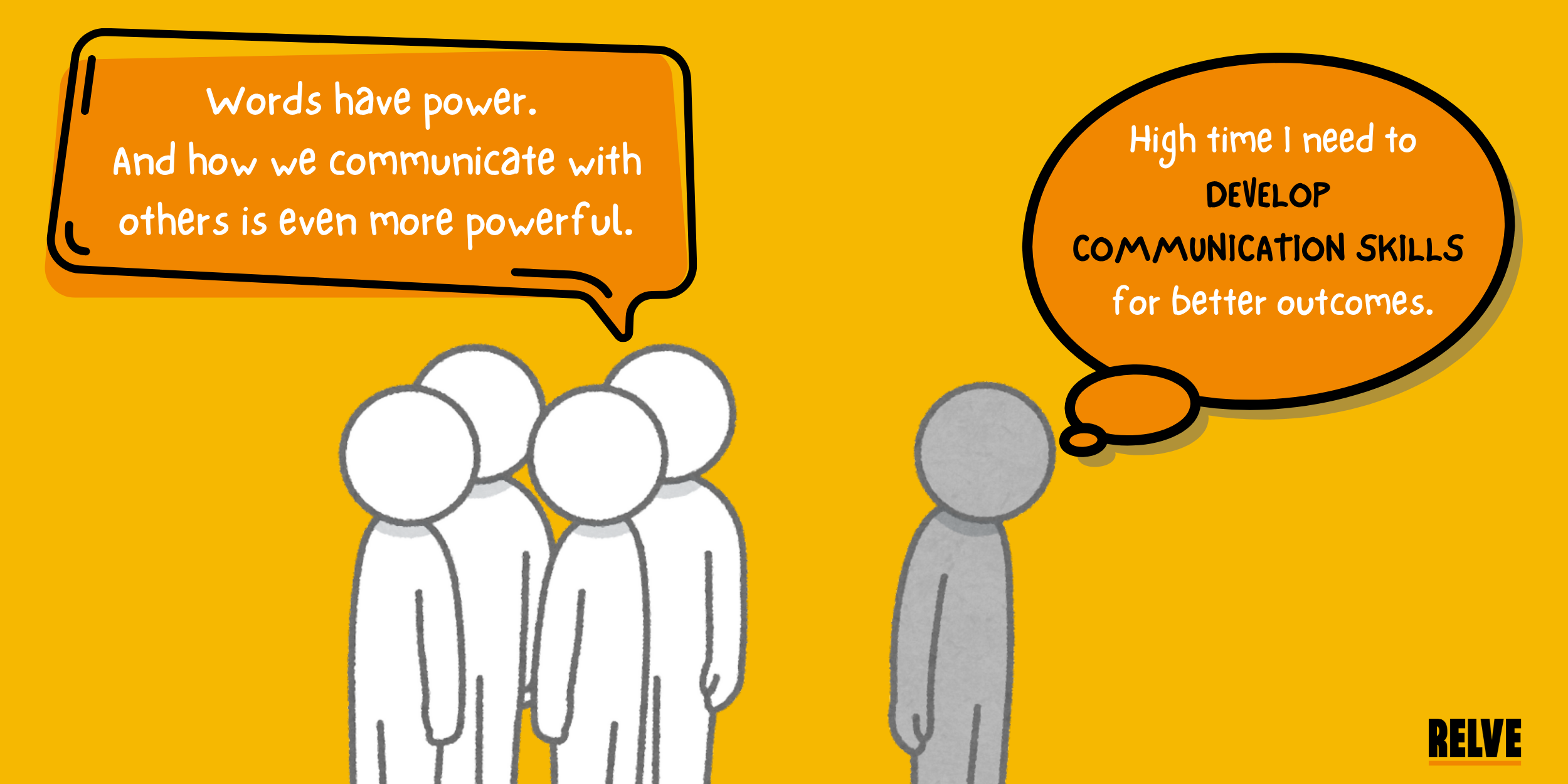We only remember about 25 to 50 percent of what we hear. That’s like ordering a full pizza and getting one cold slice. And guess what? It happens all the time. That’s because most of us were taught to reply, not to listen. Most people don’t know how to develop listening skills. They hear noise, not meaning.
Listening is a skill like juggling or making that perfect cup of coffee. You can learn it. In this guide, we’ll walk you through how to develop listening skills step by step. You’ll learn why it matters, what blocks it, the types of listening you need, and how to actually become the person people want to open up to.
What Are Listening Skills?
Let’s get one thing straight. Hearing is not listening. You can hear a dog bark or the fridge hum, but that doesn’t mean you’re tuned in.

Listening skills are about focus, empathy, understanding, and sometimes just shutting up long enough to let someone else talk. These skills help you fully absorb, interpret, and respond to what people say. There’s no special brain wiring needed. Just a little practice and a willingness to stop scrolling while someone is speaking.
The more you focus on words, intonation, and context, the sharper your comprehension becomes.
Why Listening Skills Matter
Think of listening as the Wi-Fi of communication. If it’s weak, nothing loads properly. But when it’s strong? Everything connects. Effective listening can increase workplace productivity by up to 40%. Imagine doing more by literally saying less.
Here’s why developing listening skills pays off:
- It develops social skills and builds stronger relationships
- It improves learning and retention
- It shows emotional intelligence
- It reduces conflict
- It earns respect because everyone loves being a good listener
According to a LinkedIn Workplace Learning Report, communication (including listening) is one of the top soft skills employers look for. Yet, it’s the one most people overlook.
Common Barriers to Effective Listening
You want to know how to develop better listening skills? Start by knowing what ruins them.
🧏 Which Barriers Are You Guilty Of?
1. Distractions
Phones buzzing, Slack pings, or that weird noise your AC makes. External distractions are everywhere. Internal ones too, like stress or mentally rehearsing your grocery list while someone’s venting.
2. Interrupting
Jumping in before someone finishes their thought doesn’t make you smart. It makes you impatient.
3. Judging
When you already think you know what someone’s going to say, you stop listening halfway through.
4. Lack of interest
If the conversation is dull, you’re checking out. But that’s when you need to check in harder.
Knowing these blocks helps you bulldoze them. And that’s how you begin to develop personal listening skills.
Types of Listening Skills You Should Master
Not all listening is created equal. Here are the big ones you’ll want in your toolkit.
Definition: Fully focusing, responding, and remembering what’s said.
Example: “So what you’re saying is…”
Use it in: Team meetings, one-on-ones, relationship talks.
Definition: Listening with the intent to understand emotions.
Example: “That must have been really tough for you.”
Use it in: Emotional conversations, leadership, coaching.
Definition: Analyzing what you hear to make judgments.
Example: “Is this argument supported by facts?”
Use it in: Debates, decision-making, research discussions.
Definition: Repeating back what was heard for clarity.
Example: “What I hear you saying is…”
Use it in: Conflict resolution, therapy, team alignment.
Active Listening
This is the MVP of all listening types. You pay attention, respond with cues like nodding or “I see,” and repeat what you hear. It builds trust and shows you care. Having active listening skills helps in both work meetings and heart-to-heart conversations.
Empathetic Listening
You listen for what’s not being said. This is useful for managers, therapists, or anyone who doesn’t want to come off as a robot.
Critical Listening
You’re listening to analyze and evaluate. Think debates, negotiations, or picking apart a podcast. If you want to know how to develop critical listening skills, this is your zone.
Reflective Listening
You repeat back what you heard to confirm. “So what you’re saying is…” It shows respect and reduces misunderstandings.
These are the styles that develop coordination skills between what’s said and what’s understood.
How to Develop Listening Skills
Let’s dig into the real reason you’re here. Below are practical, repeatable steps to become a great listener. No superpowers required.

1. Put Away Distractions
Your brain can’t listen if your phone’s lighting up like Times Square. Shut it down. Give the speaker your full attention. That’s step one.
2. Make Eye Contact
No need to stare like a statue. Just look them in the eye. It shows you’re present and not mentally checking your email.
3. Listen to Understand, Not to Reply
Stop planning your comeback while they’re still talking. Hear them out first. That’s how real listening starts.
4. Use Verbal and Nonverbal Cues
A simple “got it” or a nod goes a long way. These little signals show you’re engaged without interrupting.
5. Reflect and Paraphrase
Say back what you heard in your own words. It shows you’re listening and actually understand the point.
6. Practice with Audio Content
Listen to podcasts or audiobooks. Pause and rewind, pay attention to how things are said, not just what’s said.
7. Join Group Discussions
Jump into live conversations. It forces you to stay alert, think quickly, and actually respond to what’s being said.
8. Ask Clarifying Questions
Don’t pretend to get it if you don’t. Ask follow-up questions. It keeps the convo clear and shows you care.
9. Observe Body Language
People say a lot without talking. Watch their face, hands, and posture. You’ll pick up way more than just the words.
10. Use the Shadowing Technique
Repeat what the speaker says either in your head or quietly out loud. It helps lock in the rhythm and meaning, especially if you’re learning a new language.
Each of these techniques contributes to how you develop good listening skills over time. It’s not overnight. It’s like learning an instrument. One string at a time.
Listening Builds Brain Power
Yes, science backs this up too. Active listening activates multiple parts of the brain involved in empathy, memory, and decision-making. Basically, when you listen well, you get smarter.
A study found that training employees in listening increased job performance by 40%. So, learning listening skills is profitable. Listening also sharpens abstract thinking skills because you learn to connect dots others miss.
Conclusion
Listening isn’t some fluffy soft skill. It’s a power move. In this world full of noise and people waiting for their turn to talk, real listening cuts through. Want to be your better friend, leader, partner, or just not the person who always talks over others? Learning how to develop listening skills is where it starts.
Start small. Mute your phone. Ask one follow-up question today. Paraphrase what someone told you. Over time, you’ll notice that people open up more, trust you faster, and value your presence.
Because here’s the truth: anyone can talk. But those who listen? They win.
